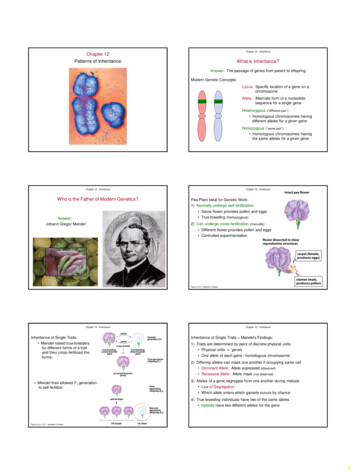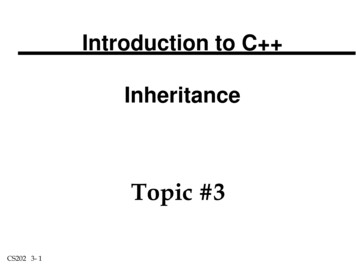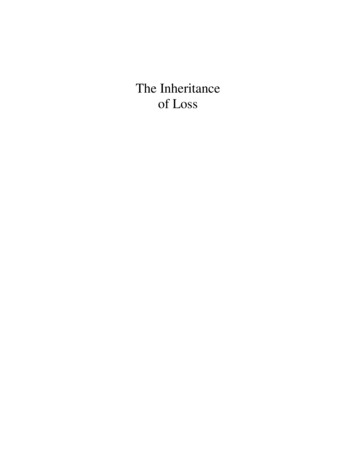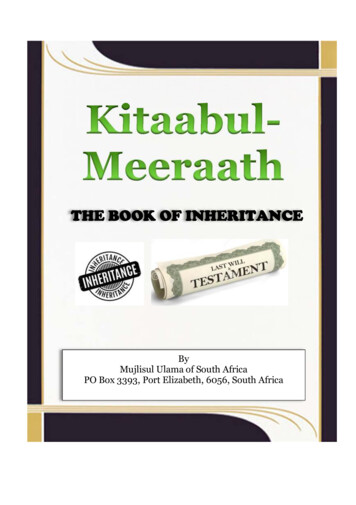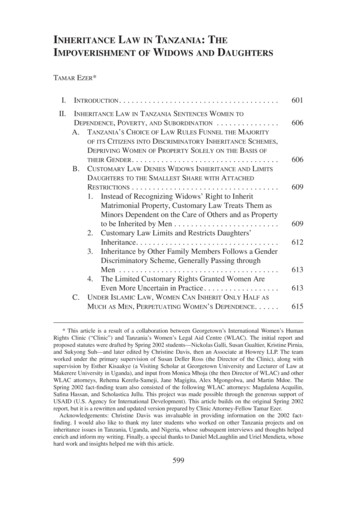
Transcription
INHERITANCE LAW IN TANZANIA: THEIMPOVERISHMENT OF WIDOWS AND DAUGHTERSTAMAR EZER*I.INTRODUCTION . . . . . . . . . . . . . . . . . . . . . . . . . . . . . . . . . . . . . .II.INHERITANCE LAW IN TANZANIA SENTENCES WOMEN TODEPENDENCE, POVERTY, AND SUBORDINATION . . . . . . . . . . . . . . .A. TANZANIA’S CHOICE OF LAW RULES FUNNEL THE MAJORITYOF ITS CITIZENS INTO DISCRIMINATORY INHERITANCE SCHEMES,DEPRIVING WOMEN OF PROPERTY SOLELY ON THE BASIS OFTHEIR GENDER . . . . . . . . . . . . . . . . . . . . . . . . . . . . . . . . . . .B. CUSTOMARY LAW DENIES WIDOWS INHERITANCE AND LIMITSDAUGHTERS TO THE SMALLEST SHARE WITH ATTACHEDRESTRICTIONS . . . . . . . . . . . . . . . . . . . . . . . . . . . . . . . . . . .1. Instead of Recognizing Widows’ Right to InheritMatrimonial Property, Customary Law Treats Them asMinors Dependent on the Care of Others and as Propertyto be Inherited by Men . . . . . . . . . . . . . . . . . . . . . . . . .2. Customary Law Limits and Restricts Daughters’Inheritance . . . . . . . . . . . . . . . . . . . . . . . . . . . . . . . . . .3. Inheritance by Other Family Members Follows a GenderDiscriminatory Scheme, Generally Passing throughMen . . . . . . . . . . . . . . . . . . . . . . . . . . . . . . . . . . . . . .4. The Limited Customary Rights Granted Women AreEven More Uncertain in Practice . . . . . . . . . . . . . . . . . .C. UNDER ISLAMIC LAW, WOMEN CAN INHERIT ONLY HALF ASMUCH AS MEN, PERPETUATING WOMEN’S DEPENDENCE . . . . . .601606606609609612613613615* This article is a result of a collaboration between Georgetown’s International Women’s HumanRights Clinic (“Clinic”) and Tanzania’s Women’s Legal Aid Centre (WLAC). The initial report andproposed statutes were drafted by Spring 2002 students—Nickolas Galli, Susan Gualtier, Kristine Pirnia,and Sukyong Suh—and later edited by Christine Davis, then an Associate at Howrey LLP. The teamworked under the primary supervision of Susan Deller Ross (the Director of the Clinic), along withsupervision by Esther Kisaakye (a Visiting Scholar at Georgetown University and Lecturer of Law atMakerere University in Uganda), and input from Monica Mhoja (the then Director of WLAC) and otherWLAC attorneys, Rehema Kerefu-Sameji, Jane Magigita, Alex Mgongolwa, and Martin Mdoe. TheSpring 2002 fact-finding team also consisted of the following WLAC attorneys: Magdalena Acquilin,Safina Hassan, and Scholastica Jullu. This project was made possible through the generous support ofUSAID (U.S. Agency for International Development). This article builds on the original Spring 2002report, but it is a rewritten and updated version prepared by Clinic Attorney-Fellow Tamar Ezer.Acknowledgements: Christine Davis was invaluable in providing information on the 2002 factfinding. I would also like to thank my later students who worked on other Tanzania projects and oninheritance issues in Tanzania, Uganda, and Nigeria, whose subsequent interviews and thoughts helpedenrich and inform my writing. Finally, a special thanks to Daniel McLaughlin and Uriel Mendieta, whosehard work and insights helped me with this article.599
600THE GEORGETOWN JOURNAL OF GENDER AND THE LAWD.III.IV.V.[Vol. VII:599ALTHOUGH GENDER NEUTRAL, THE INDIAN SUCCESSION ACTIS RARELY APPLIED . . . . . . . . . . . . . . . . . . . . . . . . . . . . . . .BOTH BY LAW AND PRACTICE, THE ADMINISTRATION OF ESTATESFAVORS THE SELECTION OF MALE ADMINISTRATORS TO OVERLOOKTHE RIGHTS OF WOMEN . . . . . . . . . . . . . . . . . . . . . . . . . . . . . . .A. TANZANIAN LAW TENDS TO APPOINT MALE ADMINISTRATORSAND PROVIDES NO ADEQUATE ALTERNATIVE IN CASE OFPROBLEMS. . . . . . . . . . . . . . . . . . . . . . . . . . . . . . . . . . . . . .B. IN PRACTICE, THE ADMINISTRATION OF ESTATES FURTHEREXACERBATES DISCRIMINATION IN THE LAW . . . . . . . . . . . . . .EXPLOITATIVE PRACTICES AND THE SOCIAL CONTEXT IN TANZANIAAGGRAVATE THE EFFECT OF DISCRIMINATORY INHERITANCE LAWS . . . .A. TANZANIA’S INHERITANCE LAWS FAIL TO DEAL WITH, AND INFACT ENCOURAGE, PROPERTY GRABBING BY RELATIVES . . . . .B. AS TANZANIA’S LAWS CONNECT INHERITANCE TO CHILDREN,RELATIVES MAY TRY TO TAKE THE CHILDREN AWAY FROMTHE WIDOW IN ORDER TO ACCESS THEIR PROPERTY . . . . . . . . .C. WIDOWS ARE ACCUSED OF CAUSING THEIR HUSBAND’S DEATHTHROUGH WITCHCRAFT AND, THEREFORE, EVICTED FROM THEFAMILY HOME AND DENIED ALL ACCESS TO PROPERTY . . . . . .D. CONSIDERING INHERITANCE DISPUTES A FAMILY MATTER,POLICE OFFICERS RARELY BECOME INVOLVED TO ASSISTWOMEN . . . . . . . . . . . . . . . . . . . . . . . . . . . . . . . . . . . . . . .E. IN CASES OF POLYGAMY, AFTER A HUSBAND’S DEATH, THEREIS INCREASED TENSION AND DECREASED ACCESS TO ALREADYLIMITED ECONOMIC RESOURCES . . . . . . . . . . . . . . . . . . . . . .F. THE HIGH DEATH TOLL IN TANZANIA DUE TO AIDS HASMAGNIFIED THE DISCRIMINATORY EFFECTS OF INHERITANCELAWS, AND ECONOMICALLY DISEMPOWERED WOMEN AREINCREASINGLY VULNERABLE TO THE DISEASE . . . . . . . . . . . . .DISCRIMINATORY INHERITANCE LAWS VIOLATE THE RIGHTS OFWOMEN TO EQUALITY, PROPERTY, AN ADEQUATE STANDARD OFLIVING, FAMILY, AND DIGNITY . . . . . . . . . . . . . . . . . . . . . . . . . .A. BY DENYING WOMEN INHERITANCE BASED SOLELY ON THEIRGENDER, TANZANIA’S INHERITANCE REGIME VIOLATES THERIGHT TO EQUALITY . . . . . . . . . . . . . . . . . . . . . . . . . . . . . . .B. DEPRIVED OF INHERITANCE, TANZANIAN WOMEN ARE DENIEDTHEIR RIGHT TO PROPERTY . . . . . . . . . . . . . . . . . . . . . . . . . .C. THE DENIAL OF INHERITANCE RIGHTS SUBJECTS WOMEN TOPOVERTY, VIOLATING THEIR RIGHT TO AN ADEQUATESTANDARD OF LIVING . . . . . . . . . . . . . . . . . . . . . . . . . . . . . .D. TANZANIA’S INHERITANCE LAWS VIOLATE THE RIGHT TO616617617620621622623624624625626627629633635
2006]INHERITANCE LAW IN TANZANIA601FAMILY BY INTERFERING WITH A WIDOW’S RELATIONSHIP WITHCHILDREN AND OBSTRUCTING HER REMARRIAGE . . . . . . . .E. TREATING WOMEN AS CHILDREN OR PROPERTY, TANZANIA’SINHERITANCE REGIME ROBS WOMEN OF THEIR DIGNITY . . . . . .639NEITHER CULTURE NOR RELIGION CAN JUSTIFY TANZANIA’SDISCRIMINATORY INHERITANCE REGIME . . . . . . . . . . . . . . . . . . . .640TO COMPLY WITH THE CONSTITUTION AND INTERNATIONALOBLIGATIONS, THE TANZANIAN GOVERNMENT MUST FINALLYMOVE TO ENACT A UNIFORM INTESTATE SUCCESSION ACT,PROTECTIVE OF THE RIGHTS OF WOMEN . . . . . . . . . . . . . . . . . . . .643APPENDIX A: CLINIC PROPOSED SUCCESSION ACT 2002 . . . . . . . . . . . . . .645APPENDIX B: REVISED PROPOSED SUCCESSION ACT 2002 . . . . . . . . . . . . .652HERVI.VII.637I. INTRODUCTIONTanzania’s inheritance laws are in urgent need of reform.1 Both customary andIslamic law, the two predominant systems of intestate succession in Tanzania,limit women’s inheritance on the basis of their gender. Under customary law, awidow is generally denied inheritance altogether: “[H]er share is to be cared forby her children, just as she cared for them.”2 Daughters inherit the smallest sharewith attached restrictions, and under governing Islamic law, women only inherithalf as much as men. Tanzania’s inheritance laws thus impoverish women andleave their survival at the mercy of men.The effect of these discriminatory laws is further magnified by proceduralinequalities, exploitative practices, and the spread of AIDS. Procedural lawsfavor the selection of male administrators, even if they are distant relatives of thedeceased, thus excluding women from the management of estates. Women alsohave to contend with widespread property grabbing, eviction from their homesunder witchcraft accusations, and sometimes even the loss of their children byabusive relatives. Women in polygamous families have to further split anymeager inheritance they do receive. Suffering is especially severe in light of theAIDS pandemic, which has increased the number and vulnerability of widowsand orphans. The extent of this crisis is evident in the numerous Tanzaniansseeking assistance for inheritance-related problems.31. This article deals solely with mainland Tanzania and does not discuss the situation in Zanzibar.2. Local Customary Law (Declaration) (No. 4) Order, Government Notice (GN) 436/1963, SecondSchedule, Laws on Inheritance [Sheria za Urithi], rule 27 in Judicature and Application of Laws Act,TANZ. LAWS SUBSIDIARY LEGIS. [CAP 358 R.E. 2002] [hereinafter GN 436, 2d sched.].3. The Tanzanian government identified “the main legal problems facing women” as including“property adjustment . . . after the death of the male spouse.” United Republic of Tanzania, Second andThird Reports to Committee on the Elimination of Discrimination Against Women, para. 14, U.N. Doc.CEDAW/C/TZA/2-3 (Sept. 30, 1996). The Women’s Legal Aid Centre (WLAC) reported that out of the
602THE GEORGETOWN JOURNAL OF GENDER AND THE LAW[Vol. VII:599Tanzania’s inheritance regime violates women’s fundamental rights to equal ity, property, an adequate standard of living, family, and dignity under theTanzanian Constitution and binding international conventions. In 2000, Tanzaniaamended its Constitution to prohibit discrimination on the basis of genderexplicitly.4 Equality is likewise a basic principle under international law,5requiring modification of Tanzania’s inheritance laws. The Committee respon sible for implementing the Convention on the Elimination of all Forms ofDiscrimination against Women (“CEDAW Committee”) specifically instructedthat the allocation of unequal inheritance shares to widows and daughters“contravene the Convention and should be abolished.”6 The Human RightsCommittee focused on “property and inheritance rights” as requiring particularattention for Tanzania’s compliance with the International Covenant on Civil andPolitical Rights.7 The Protocol to the African Charter on the Rights of Women inAfrica, in force since November 2005, speaks directly to this issue:A widow shall have the right to an equitable share in the inheritance ofthe property of the husband. A widow shall have the right to continue tolive in the matrimonial house . . . . Women and men shall have the rightto inherit, in equitable shares, their parents’ properties.83,266 cases it handled in 2000, 575 were inheritance matters. WLAC 2000 ANNUAL REPORT 5 (2000).WLAC’s paralegal centers throughout Tanzania additionally assisted over 127 women with inheritanceproblems the same year. Id. at 13-21. A Muslim leader in Kibaha estimated that his religious counciladvises three to five women per month with inheritance problems. Interview with Muslim Leader inKibaha, Tanzania (Mar. 24, 2002). A village tribal leader, responsible for the oversight of 276 families inthe same district, counsels another one to two women per month on these matters. Interview with TribalLeader in Kibaha, Tanzania (Mar. 24, 2002).4. TANZ. CONST. art. 13(5). Even previously, courts have held that the Constitution’s generalprohibition on discrimination included violations of women’s equality, implicating discriminatoryinheritance laws. As the Court explained in Ephrahim v. Pastory, decided in 1990, “[S]ince the Bill ofRights was incorporated in our 1977 Constitution . . . discrimination against women has been prohib ited.” Ephrahim v. Pastory, [1990] LRC (Const.) 757, 762 (Tanz. High Ct. 1990).5. Human Rights Committee, General Comment 18, Non-discrimination, 37th Sess., 1989, Compila tion of General Comments and General Recommendations Adopted by Human Rights Treaty Bodies, at146, para. 1, U.N. Doc. HRI/GEN/1/Rev.6 (May 12, 2003) [hereinafter HRC General Comment 18](“Non-discrimination, together with equality before the law and equal protection of the law without anydiscrimination, constitute a basic and general principle relating to the protection of human rights.”). Seeinfra Part V(A) for specific convention provisions on the right to equality.6. CEDAW Committee, General Recommendation 21, Equality in Marriage and Family Relations,13th Sess., 1992, U.N. Doc. A/49/38, at 1 (1994), reprinted in Compilation of General Comments andGeneral Recommendations Adopted by Human Rights Treaty Bodies, at 257, para. 35, U.N. Doc.HRI/GEN/1/Rev.6 (May 12, 2003) [hereinafter CEDAW General Rec. 21].7. HRC, Concluding Observations on Second Report: United Republic of Tanzania, para. 189, U.N.Doc. CCPR/A/48/40 (1993). In 1998, the Committee was likewise “concerned at the application ofpersonal laws which discriminate against women with respect . . . to . . . land and inheritance.” HRC,Concluding Observations on Third Report: United Republic of Tanzania, at 3, para. 12, U.N. Doc.CCPR/C/79/Add.97 (Aug. 18, 1998).8. Protocol to the African Charter on Human and Peoples’ Rights on the Rights of Women in Africa,art. 21(1), (2) (Nov. 25, 2005), available at http://www.umn.edu/humanrts/africa/protocol women2003.html [hereinafter African Women’s Protocol].
2006]INHERITANCE LAW IN TANZANIA603The necessity for change to protect women’s basic rights could not be any clearer.This need to reform outdated inheritance laws is widely recognized. AsTanzania’s Law Reform Commission explained, “[D]iscrimination in inheritanceon the basis of sex has received critical judicial assessment. Not only judges, butacademic writers, politicians and women [activists] have decried this appallingstate of affairs.”9 In Ephrahim v. Pastory, the High Court characterizedrestrictions on women’s ability to inherit clan land as “oppressive and unjust lawsof the past”10 and the cause of women’s “suffering at the hands of selfish clanmembers.”11 The Tanzanian government itself has called for the elimination of“customs and traditions which negatively affect development,” such as “discrimi native gender practices in . . . inheritance”12 and acknowledged the need “[t]orevisit, review, and abandon outdated laws.”13 Tanzania’s inheritance laws areespecially anachronistic in light of more recent statutes that recognize women’s9. LAW REFORM COMMISSION OF TANZANIA, THE LAW RELATING TO CHILDREN IN TANZANIA, para. 372(Apr. 1994), available at http://www.lrct-tz.org/pdf/watoto.pdf [hereinafter LAW REFORM COMMISSIONREPORT ON CHILDREN]. The Law Reform Commission of Tanzania is a government body, established “totake and keep under review all the law of the United Republic with a view to its systematic developmentand reform.” Law Reform Commission of Tanzania Act, § 4(1), TANZ. LAWS [CAP 171, R.E. 2002]. Forexamples of academic work criticizing the Tanzania’s current inheritance scheme, see Z. S. GONDWE,FEMALE INTESTATE SUCCESSION TO LAND IN RURAL TANZANIA: WHITHER EQUALITY (1990); Monica E.Magoke-Mhoja, Impact of Customary Inheritance on the Status of Widows and Daughters in Tanzania: AChallenge to Human Rights Activists 255, in VOICES OF AFRICAN WOMEN: WOMEN’S RIGHTS IN GHANA,UGANDA, AND TANZANIA (Johanna Bond, ed., 2005); M.C. Mukoyogo, Theoretical Frame-Work on theLaw of Inheritance, in REPORT ON THE LAW OF INHERITANCE AND RESEARCH FINDINGS BY THE LAWREFORM COMMISSION OF TANZANIA (unpublished, on file with International Women’s Human RightsClinic, Georgetown University Law Center, presented to the Minister of Justice in March 1995);MAGDALENA K. RWEBANGIRA, THE LEGAL STATUS OF WOMEN AND POVERTY IN TANZANIA (1996).10. Ephrahim v. Pastory, [1990] LRC (Const.) 757, 767 (Tanz. High Ct. 1990).11. Id. at 762; see also Ndeamtzo v. Malasi, [1968] HCD 127, at 99 (Tanz. High Ct. 1968) (undercustomary inheritance laws, essential property is “snatched from the widow and unfortunate daughters byundeserving clan members,” “putting the widow and daughters into terrible confusion, fear, andmisery”).12. MINISTRY OF COMMUNITY DEVELOPMENT, WOMAN AFFAIRS AND CHILDREN, COMMUNITY DEVELOP MENT POLICY 41 (June 1996).13. MINISTRY OF COMMUNITY DEVELOPMENT, WOMAN AFFAIRS AND CHILDREN, CHILD DEVELOPMENTPOLICY 32 (Oct. 1996). In particular, the Ministry referred to the codification of customary inheritancelaw. Id. at 37. Tanzania’s government has described the dire state of affairs:[W]ives are widely considered a part of their husband’s labour force, and married women arelargely not given inheritance rights but only enjoy the use of their deceased husband’s propertyby [sic] virtue of their male children. Childless women are therefore accorded very limitedrights. Unmarried daughters also suffer from similar problems since they have no fullinheritance rights to family property compared to their brothers. Thus the adult woman of todayis very much a product of the socialization process and lack of opportunities that faced her as achild since the day of her birth.United Republic of Tanzania, Revised Initial Report to Committee on the Right of the Child, at 16, para.20, U.N. Doc. CRC/C/8/Add.14/Rev.1 (Sept. 25, 2000) [hereinafter Revised Initial Report to CRC].
604THE GEORGETOWN JOURNAL OF GENDER AND THE LAW[Vol. VII:599equal property rights.14 In fact, Tanzanian women are economically better off iftheir marriages end in divorce than by the death of their husbands.15However, the “law has remained immutable and insensitive to . . . publicoutrage.”16 Reform efforts date back to 1968 when the government appointed aspecial committee to investigate inheritance matters, but failed to implement thecommittee’s recommendations.17 In 1987, Tanzania’s Attorney General asked theLaw Reform Commission to study problems in inheritance law and recommendreforms.18 The Commission published a report urging the creation of a uniform,non-discriminatory intestate succession statute in 1995.19 As of yet, no action hasbeen taken.In spring 2002, in collaboration with the Women’s Legal Aid Centre (WLAC)in Tanzania, Georgetown’s International Women’s Human Rights Clinic con ducted a fact-finding mission on the inheritance regime in Tanzania. The Clinicand WLAC interviewed over sixty people, ranging from Tanzanian judges,Parliament members, and police officers, to religious leaders, advocates, andcitizens. Through these interviews, the team tested reactions to a potentialuniform intestate succession law, which it later refined.20 Under this proposedstatute, the surviving spouse—whether husband or wife—would inherit thematrimonial home, any household belongings, and property with a jointownership interest. Thereafter, the surviving spouse would receive 45% of the14. Law of Marriage Act of 1971 §§ 56, 65, 114, TANZ. LAWS [CAP 29, R.E. 2002] [hereinafter LMA];Land Act of 1999 § 3(2), TANZ. LAWS [CAP 113, R.E. 2002] [hereinafter Land Act]; Village Land Act of1999 § 3(2), TANZ. LAWS [CAP 114, R.E. 2002] [hereinafter Village Land Act].15. See LMA, supra note 14, § 114 (recognizing the wife’s contribution in the division of maritalassets at divorce). See also infra Part V for a discussion on the right to property.16. LAW REFORM COMMISSION REPORT ON CHILDREN, supra note 9, para. 372.17. LAW REFORM COMMISSION OF TANZANIA, THE LAW OF SUCCESSION/ INHERITANCE 12 (1994),available at http://www.lrct-tz.org/pdf/mirathi.pdf [hereinafter LAW REFORM COMMISSION REPORT ONSUCCESSION/INHERITANCE].18. Id. at 13.19. Id. The Law Reform Commission highlighted how in various regions of Tanzania, “[t]he majorityviews are that, only unification of the laws of Succession/ Inheritance could do away with the problems ofuncertainty which brings about confusion and choice of law.” Id. at 34. It further explained, “In keepingwith the provisions of the Constitution on human rights as also embodied under the Law of MarriageAct . . . the proposed Law of Succession must also give recognition to and protect such women’s rights toacquire, manage, and dispose of their property by way of inheritance.” Id. at 65.20. See infra Appendix A for the text of the Clinic’s Proposed Statute, developed in collaboration withWLAC [hereinafter Clinic’s Proposed Statute]. The Clinic’s proposed statute provides for the transfer ofup to a third of an individual’s property by will, enabling Tanzanians to give effect to their personalpreferences and religious convictions, while still allowing widows and daughters the chance at a decentlife. Tanzania’s Law Reform Commission likewise recommended that “the rules on Wills . . . limit thepower of testamentary disposition” to 1/3 of the estate. LAW REFORM COMMISSION REPORT ONSUCCESSION/INHERITANCE, supra note 17, at 67. See infra Appendix B for the text of the RevisedProposed Statute [hereinafter Revised Proposed Statute], which is currently before the Tanzaniangovernment. See also infra note 22 (discussing the revised proposed statute).
2006]INHERITANCE LAW IN TANZANIA605estate, the children 45%, and the parents 10%.21 Additionally, the Clinic’sproposed bill favors the surviving spouse as the administrator of the estate, and itcriminalizes property grabbing, eviction from the family home, the taking ofchildren, and widow inheritance—that is the “inheritance” of the widow herselfby male relatives. The following summer, WLAC continued work on theproposed statute to ensure it best fit the needs of Tanzanians through meetingsand discussions with other NGOs and government officials.22 The resulting billreceived substantial public support and was submitted to the Minister of Justiceand Constitutional Affairs in the President’s Cabinet. The Bill needs to receivePresidential approval before it can be presented to Parliament, but work came to ahalt in early 2004 as government decided to wait until after the 2005 elections.23Tanzania’s inheritance laws continue to impoverish widows and daughters, andthe time for action has never been more urgent.This article analyzes the current inheritance system in Tanzania and advocatesfor the enactment of a uniform and non-discriminatory succession act in order tomeet Tanzania’s constitutional and international obligations. Parts II and IIIdescribe the shortcomings of existing inheritance law: both in its substantiveprovisions and procedural provisions governing the administration of estates.Part IV situates discriminatory inheritance laws within the social context inTanzania and alongside aggravating exploitative practices. Part V lays outwomen’s fundamental rights to equality, property, an adequate standard of living,family, and dignity violated by the current regime. Appendix A provides theClinic’s proposed statute, and Appendix B provides the revised proposed statuteput together by WLAC.21. In polygamous marriages, each widow would inherit her matrimonial home and householdchattels, and the widows would share the spousal percentage of the estate. Clinic’s Proposed Statute, infraAppendix A, § VIII(F)(1).22. Under the revised proposed statute, the surviving spouse is similarly given priority inadministering the estate and is entitled to “the matrimonial home and household chattels” and his or hershare of all other property in accordance with the Law of Marriage Act and Land and Village Acts.Revised Proposed Statute, infra Appendix B, §§ 4(1), 10. However, all other property can be distributedby will. Id. §§ 4(2), 6. In the absence of a will, a widow or widower inherits 50% of the estate, and thechildren inherit the other 50%. Id. § 20(1)(b). The deceased’s parents can only inherit when there isneither a spouse nor children. Id. § 20(1)(c)-(e). Mirroring the Clinic’s proposal, the revised statutespecifically provides that “[e]very heir shall receive an equal share regardless of his or her sex, age,religion, tribe, custom, tradition, disability, race, color, political or other opinion, national or social origin,place of origin, property, birth, health status, station in life, or other status” and that “[w]omen and menshall have equal rights to dispose clan land.” Id. §§ 16, 18. The statute likewise criminalizes the evictionof widows and children from their homes, property grabbing, the removal of children, and widowinheritance. Id. §§ 22-23. In addition, this version addresses forceful intercourse “to bless or cleanse” awidow, terming it “an offense of rape contrary to . . . the Penal Code as amended by the Sexual Offenses(Special Provisions) Act.” Id. § 24.23. To further delay matters, the government is considering issuing a “White Paper,” calling forhearings throughout the country to determine citizens’ reactions to changing customary inheritance law.This would duplicate the work already undertaken by the Law Reform Commission for its inheritancereport.
606THE GEORGETOWN JOURNAL OF GENDER AND THE LAW[Vol. VII:599II. INHERITANCE LAW IN TANZANIA SENTENCES WOMEN TO DEPENDENCE,POVERTY, AND SUBORDINATIONTanzania’s inheritance laws subordinate and impoverish women. Denied equalshares of inheritance, women lack access to economic resources and are kept in astate of perpetual dependence. Indeed, Tanzania’s Law Reform Commissionidentified succession laws as “among [the] major factors that have greatlyworked toward the derogation of the status of women . . . .”24 The time has comefor Tanzania to remedy this disempowerment and enact an intestate successionact protective of the rights of all Tanzanian women.A. TANZANIA’S CHOICE OF LAW RULES FUNNEL THE MAJORITY OF ITS CITIZENSINTO DISCRIMINATORY INHERITANCE SCHEMES, DEPRIVING WOMEN OF PROPERTYSOLELY ON THE BASIS OF THEIR GENDERAlthough three parallel systems of intestate succession operate in Tanzania,25choice of law rules channel the majority of Tanzanian citizens into a discrimina tory regime. These three systems are customary law, referring to traditional triballaw; Islamic law; and the Indian Succession Act. While the Indian Succession Actis gender neutral, both customary and Islamic law are discriminatory, asdiscussed in detail below. Customary law is codified in Tanzania,26 while variousstatutes provide for the application of Islamic law to govern the inheritance ofMuslims27 (approximately forty-five percent of the Tanzanian population).28 TheIndian Succession Act consists of codified English law from 1865 imported to24. LAW REFORM COMMISSION REPORT ON SUCCESSION/INHERITANCE, supra note 17, at 3.25. There is also a fourth system which governs intestate succession for Hindus. However, it will notbe dealt with in this article as it has only “limited applicability within the Hindu community,” and “[s]ofar there are no known court cases on the subject in the country.” LAW REFORM COMMISSION REPORT ONSUCCESSION/INHERITANCE, supra note 17, at 24.26. Customary law is codified in two Government Notices: GN 279 and GN 436. These GovernmentNotices apply to the following districts through subsidiary legislation to the Judicature and Application ofLaws Act: Handeni, Kahama, Kondoa, Lushoto, Musoma, Ngara, Nzega, Pangani (Local Customary Law(Declaration) Order ¶ 2); Dodoma, Iramba, Mpwapwa, Manyoni, Shinynga, Singida, Ufipa (LocalCustomary Law (Declaration) (No. 2) Order ¶ 2); Kasulu, Kibondo, Kigoma (Local Customary Law(Declaration) (No. 3) Order ¶ 2); Kilimanjaro, Maswa, Meru, Songea (Local Customary Law(Declaration) (No. 5) Order ¶ 3); and Biharamulo, Mpanda, North Mara, Tabora, and Ulanga (LocalCustomary Law (Declaration) (No. 7) Order ¶ 2). Judicature and Application of Laws Act, TANZ. LAWSSUBSIDIARY LEGIS. [CAP 358, R.E. 2002]. This codification covers Tanzania’s patrilineal communities.Eighty percent of Tanzanian communities are patrilineal and the remaining twenty percent arematrilineal. LAW REFORM COMMISSION REPORT ON SUCCESSION/INHERITANCE, supra note 17, at 21.27. Probate and Administration of Estates Act, § 88(1)(a), TANZ. LAWS [CAP 352, R.E. 2002][hereinafter Probate and Administration of Estates Act]; Statements of Islamic Law, Government Notice(GN) 222/1967 in Islamic Law (Restatement) Act, § 48(1)(c), TANZ. LAWS SUB. LEGIS. [CAP 375, R.E.2002] (providing for the distribution of property “in accordance with the rules regulating inheritance”under Islamic law); Judicature and Application of Laws Act, § 11(c)(ii), TANZ. LAWS [CAP 358, R.E.2002] [hereinafter JALA] (“[N]othing in this subsection shall preclude any court from applying the rulesof Islamic law in matters of . . . inheritance.); Succession (Non-Christian Asiatics) Act, § 6(1), TANZ.LAWS [CAP 28, R.E. 2002] (“[T]he succession to the movable property in Mainland Tanzania of adeceased Non-Christian Asiatic . . . shall be regulated by the law of the religion professed by that
2006]INHERITANCE LAW IN TANZANIA607Tanzania from India by the British who exercised colonial powers over both countriesat the time.29 The Indian Succession Act is in need of updating to fit the needs ofTanzanians and to bring it into the modern era. Unlike in Tanzania, intestate successionlaw in both India and the United Kingdom has been modified from the 1865 version.30As explained below, choice of law and practical considerations combine against theapplication of the Indian Succession Act, and both customary and Islamic law deprivewomen of inheritance solely on the basis of their gender.Tanzanian choice of law provisions favor the application of discriminatorycustomary law to most Tanzanians of African origin. By statute, customary lawregulates succession for “a person who is or was a member of a community inwhich rules of customary law relevant to the matter are established andaccepted.”31 Customary law is thus the default system for Tanzanians of African,but not European or Asian, descent. Tanzanians from African communities canescape the application of customary law only if they can meet the requirements ofone of two statutory tests: they must either show (1) that “it is apparent, from thenature of any relevant act or transaction, manner of life or business, that thematter is . . . to be regulated otherwise than by customary law,”32 or (2) that thedeceased professed Islam or Christianity and “written or oral declarations . . . orhis acts or manner of life [reveal] that he intended his estate to be administered”according to Islamic law or the Indian Succession Act.33 Both of these tests aredifficult to satisfy. The second test is especially problematic since the deceasedNon-Christian Asiatic at death.”); Magistrates’ Courts Act, § 18(1)(a)(i) and Fifth Schedule, § 1(1), TANZ.LAWS [CAP 11 R.E. 2002] [hereinafter Magistrates’ Courts Act].Section 7(3) of the Magistrates’ Courts Act provides for assessors to sit on Ta
Tanzania’s inheritance laws are in urgent need of reform. 1 . Both customary and Islamic law, the two predominant systems of intestate succession in Tanzania, limit women’s inheritance on the basis of their gender. Under customary law, a widow is generally denied inherit


